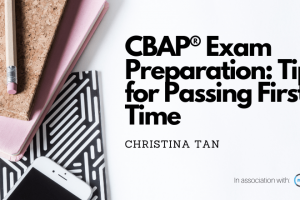
How to Ace a Business Analyst Interview
Introduction: Growing Demand for Business Analysts
In recent studies, a vast majority of graduates and experienced professionals view the career growth Business Analysis as “excellent”. With a surge of financial investment in IT, over 70% of organizations have reported that they have a digital transformation in place or have one in the works (ZD Net Survey, 2019). With such investment are demand for experienced Business Analysts.
Given the potential multitude of Business Analyst-related questions available during interviews, it is common to find interviewees ending up cramming hundreds of questions to ensure that they are ready for anything the interviewer asks. However, this may not need to be the case. This article outlines a the principles to ace a Business Analyst interview by preparing smart.
Business Analysts’ Interview Checklist: 5 Key Principles
1. How much Information can you provide about your Potential Employer if Someone Asks?
Being asked about your potential employer is part of the starting questions in interviews across any professions and is widely seen as a relatively simple way of making a strong impression on the interviewers, provided you has done your homework. Do not skim on this aspect and ensure that adequate research is done on this area.
The types of information that I had memorised for my interviews are:
- When the organisation was established.
- What types of products/ services they provide.
- How the organisation had evolved since it was established.
- Last 2 years’ financial performance, if available.
- At least 1 piece of latest news relating to the organisation.
- Awards won by the organisation, starting with the most recently awarded or most significant (for example, awards won by the team that you may potentially be working with).
- Why I’d like to work for this organisation.
2. Grasping the Job Specification
Reviewing the job specification in detail can often provide you with clues or even clear indications as to whether the organisation would like a generalist, specialist or Hybrid Business Analyst.
Generalist Business Analyst:
A job specification with high-level Business Analyst core competencies will require you to perform business analysis activities using a wide variety of techniques in initiatives of varying scope. Generalists may or may not have specific domain expertise, and can be found skipping from one domain to another.
Specialist Business Analyst:
Job specifications can often articulate a the need for the practitioner to use a more focused set of techniques, for example data modeling and use of data querying tools such as SQL for Data Business Analysts. Specialist Business Analysts typically apply a smaller range of techniques compared to generalists whilst possessing a greater level of expertise in their niche areas and are capable of resolving extremely complex business problems.
Hybrid Business Analyst:
For some organizations, hybrids represent the best of both worlds. Some small or medium sized organizations may prefer someone with business analysis tools combined with knowledge in another discipline, for example project management, testing, or user experience design. Hybrid Business Analysts are typically expected to perform multiple duties in addition to business analysis work.
Once the competencies associated to the particular role is understood, you will be in pole position to arm yourself with sufficient preparation. Resources may be at hand if you require further information. For example, if the job specification details are not clear, it is advisable to contact the recruitment team to obtain further details to ensure that you stand the best chance of success in the interview process. If you have secured interviews through recruitment agencies, they are often able to share some useful insights on the questions being asked or information on the interviewers.
3. Be Authentic and Share Your Story
Most organizations are increasing their adoption of competency-based questions in interviews, but this does not mean that one should only stick to ‘cookie cutter’ answers. To succeed, be prepared to dig deep into your own experience and share your experience that leads to positive outcomes, elaborating on how you have turned the situation around.
Instilling your character early in the interview will be advantageous as building rapport with them during the interview session and establish your presence. By selling your own brand, you can set yourself apart from other candidates, allowing you to stand out from the pool of other candidates as the interviewers starts to understand your character, how you approach tasks and deliver.
4. Allude to your Passion on your Discipline
According to IIBA’s 2018 survey, 34% of Business Analysts are between the ages of 26-35, and 64% have 10 years’ experience or less. Although younger or relatively inexperienced Business Analysts may feel as though the odds are stacked against them in some recruitment processes, this may not always be the case. It is important to emphasise that, by the interview stage, the recruiter had already sifted through a number of candidates. There will be reason why you were selected for an interview out of the other candidates. They may see potential for growth in you whereas they might not for others. However, this needs to be articulated by you as an interviewee.
Interviewers will want to see excitement about the role and passion for the discipline. Look into weaving into your planned interview answers any particular assignments that had particularly enjoyed or learned from. Where there are any competencies where you may lack experience, consider hypothetical scenarios and explain to the interviewers how you would approach a given set of circumstances. Above all, you need to prove to the interviewers that you have potential to become successful in their organisation.
5. Be armed with Intelligent Questions that will Impress the Interviewer
At the end of every interview, the employer will often turn the reigns over to you and invites you to ask any questions that you have around the role or organisation. Arriving with little to no questions leaves a bad impression, and this is particularly true for Analyst positions where good questions ‘bread and butter’ of their roles.
Typical questions that you may consider asking include:
- What are the top 3 issues that your team is currently facing, and what is expected of the ideal candidate to help resolve these?
- What are the top challenges will the ideal candidate face in this role?
- What are the key attributes that the ideal candidate will need to succeed in this role?
- What are the types of projects or initiatives the ideal candidate will be working on?
- What do you most enjoy about working for this organisation?
Luck Favors the Prepared
Preparing for the commonly asked questions certainly has a calming effect which is an important ingredient in interviews. Removing unnecessary stress and anxiety away on particular questions will help in calming your nerves for future questions. The foundation underpinning the 5 point checklist above is the art of being prepared.
The key is to develop a rolodex of interview questions and answers that caters to the type of Business Analyst role the organisation is advertising. Start by listing the core competency requirements for the role that you are applying for, then research the interview questions that may be asked followed by planning your response accordingly.
There are 3 common types of questions that may be asked:
1. Business Analysis Questions
The interviewers may wish to either start the interview with some technical questions, or include this alongside competency based questions. Such questions are asked to test the knowledge areas and may only require a factual response under most circumstances.
There are many typical Business Analysis questions that can be asked, so using a comprehensive reference such as the Business Analysis Book of Knowledge (BABoK) will be useful.
- Describe the role of a Business Analyst and the qualities that they should have.
- Describe how you would perform a gap analysis?
- What is BPMN and name its five basic elements’ categories.
- What do you prefer as a Business Analyst – Waterfall or Agile? (The interviewer may not be asking for your preferences. For further details, refer to my previous article on waterfall vs Agile)
- How can you avoid scope creep?
Applying principle 2 in the above checklist, if you can confidently categorise the type of Business Analyst that the organisation is seeking, this will effectively narrow down the technical questions required for your interview preparation.
2. Competency Based Questions
When preparing your interview responses, consider framing the response using a particular method in order to answer in a consistent manner. One of the most popular methods recommended to candidates is the STAR technique, which denotes Situation, Task, Action and Result. Competency-based questions are increasingly popular with employers. Such questions may not always be technical Business Analyst questions, but rather those that tests one’s behavioural and transferable skills such as time management, leadership, influencing, amongst others.

Some common competency based Business Analysis questions may include:
- Describe a time when you have worked with a difficult stakeholder.
- Describe how you would typically approach a project.
- Describe a time when you had to manage requirement changes.
- Describe a time when you struggled to meet and deadline and how you dealt with the situation.
- Describe a time when you have had to deal with a setback.
- Describe a time that you led a team to success.
Applying principles 3 and 4 above by sharing your story in an authentic demeanour will make the answers memorable to the interviewers and give you the competitive edge.
3. Your Choice of Career Discipline and Career Aspirations
In the case of permanent roles, towards the start of the interview, interviewers tend to ask interviewees why they have chosen a specific career discipline and what motivates them, followed by questions along the lines of “where would you like to be in 3-5 years time?”. It is imperative that you prepare for easily anticipated questions such as this, and expressed in a strongly convincing way that your skills and interest meets the organisation’s needs now and in the future.
To determine whether you are a good fit for the organization, interviewers typically ask why you want to work for the organization and why you are interested in the role. This is where principles 1 and 5 in the checklist above will need to be applied. A more in-depth research into the organization will give you a better chance of answering the questions that may come your way during the interview. By also asking questions about the organization and role, it demonstrates your level of interest and indicates that, like the interviewer, you are also assessing the fit at your end.
How to succeed in a Business Analyst Interview
The critical success factor of succeeding in interviews boils down to preparation and research. As the number of candidates always exceed the number of openings, it is advisable for you to put yourself in the interviewer’s shoes and anticipate any concerns or reservations that they may have, on top of making a strong first impression. Completion of interview preparation based on the 5 key principles above makes you approach the interview in a more reassured and confident manner. In addition to the preparation, remember to have fun! Demonstrating your charisma and giving the interviewers the impression that you would be a pleasure to work with will also give you an edge over other candidates.
Remember that the interview is a 2 way process and it serves as a crucial opportunity to confirm that you and the organisation are a good fit for each other. Leaving the interview with a good gut feeling may mean that the feeling could be mutual! Regardless of the outcome, always follow up after the interview to obtain valuable feedback so that you can strengthen your interview skills further when next needed in the future.
Tag:ba interview preparation, business analysis behavioral and situational interview questions, business analysis interview questions, Business Analyst career, business analyst interview preparation, business analyst interview preparation tips, business analyst interview tips, Career Path for a Business Analyst, how to ace a ba interview, how to ace a business analyst interview



